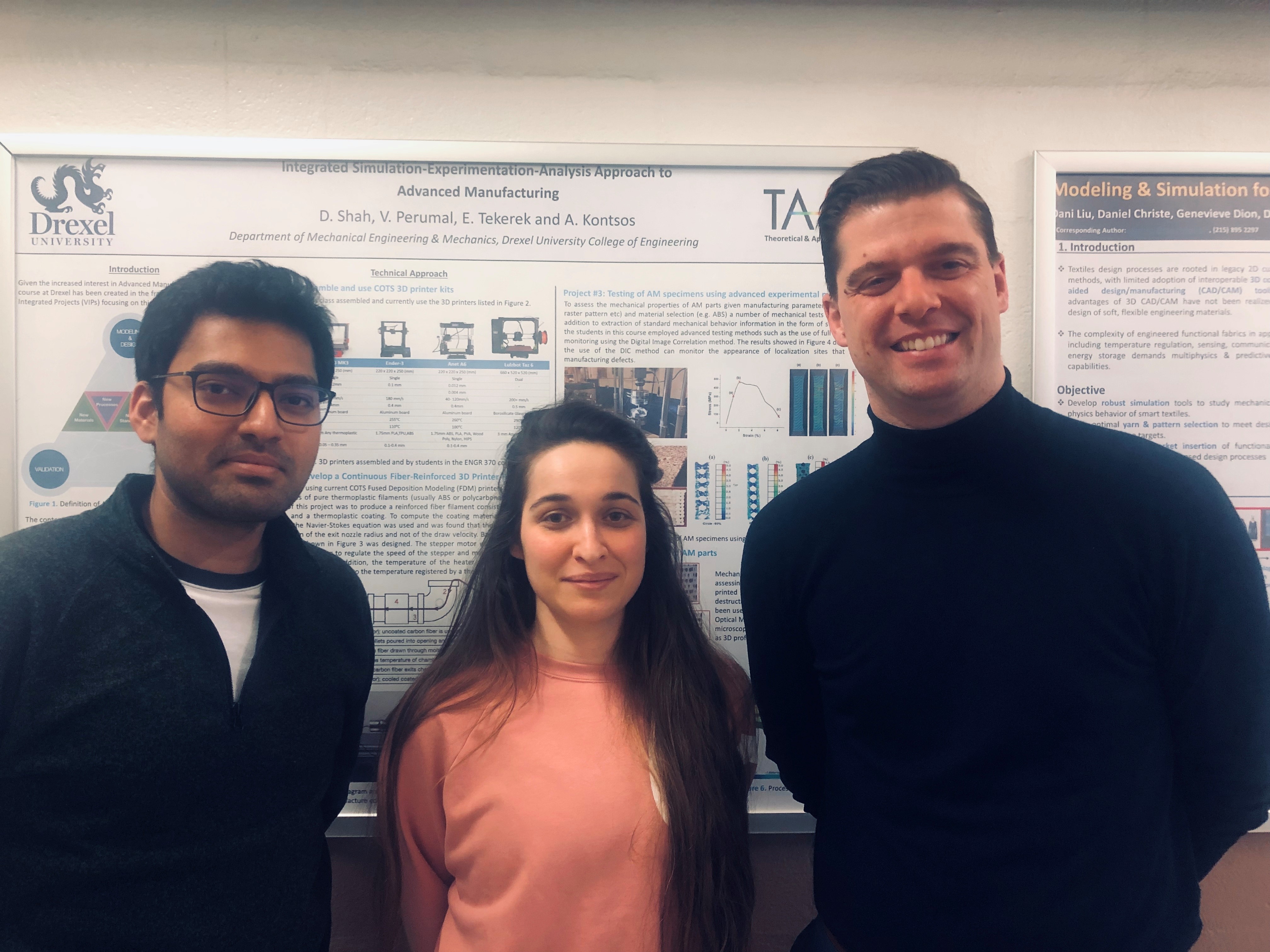Q/A with Antonios Kontsos, PhD, Associate Professor and Director of Theoretical & Applied Mechanics Group (TAMG), College of Engineering
March 5, 2019
In
2019, the Drexel Libraries appointed three Library Faculty Fellows to support
its initiative to lower students’
expenditures for required course readings by adopting, advocating, or guiding
Drexel faculty to adopt open textbooks and utilize information resources
licensed by the Libraries in lieu of traditional textbooks.
This month, the
Libraries sat down with Library Faculty Fellow and engineering professor Antonios Kontsos
to learn more about his work to utilize open education resources in freshman engineering
courses.
 Professor Antonios Kontsos is working with two Drexel graduate students to introduce OERs to freshmen engineering students.
Professor Antonios Kontsos is working with two Drexel graduate students to introduce OERs to freshmen engineering students.
Please say a few
words about your background and how you became such a supporter of the
Libraries and Open Educational Resources.
I have been a faculty member at Drexel since 2009. Over these
past 10 years, I have taught and been exposed to courses ranging from the
freshman year all the way to the graduate school. Having been educated both in
Europe and in the US, one of the issues that has always concerned me is the
cost of higher education in our country. When the Dean of Libraries told me about
the Libraries’ Faculty Fellowship focused on adopting and advocating for open educational
resources, I immediately thought this was a great opportunity for me to
contribute to that cause.
Tell me about the work you are doing with the Open
Educational Resources initiative as part of your Library Faculty Fellowship.
For my specific project,
I am working with two of my PhD students to design a new freshman course using
open educational resources. I chose a freshman required course to be the
test bed for my project for two reasons. First, because it is important to
create good learning habits from the beginning, hence the emphasis on the
freshman level. Second, because the module I will be teaching (Introduction to
digital design & advanced manufacturing) relates to a highly
interdisciplinary field for which a single textbook simply does not exist.
Hence, it made absolute sense to me and my two PhD students involved with the
project to attempt to create a course curriculum that utilizes both open
educational resources and materials licensed by the Drexel Libraries.
How will this project help students at Drexel?
I strongly
believe that this project will help both the students and us, the instructors.
For the students, it will show them how modern databases and online resources
offer a wealth of information that goes above and beyond what could be found in
a traditional textbook, printed or e-book. In addition, it will allow them to
customize their learning experience since a key component of the course is
project-based. Students will be exposed to some carefully selected core
instructional material, and they will also have to do their own research and
understand how to find information through the Libraries and elsewhere. As part
of the course, they will need to write a project proposal, utilize available
bibliographical information in their design, benchmark their numerical and
physical testing based on manuals and standards, and finally produce a final
technical report that encompasses all of the above in a way that is easily
communicated to a broader audience.
For instructors like
myself, I expect this more open approach to information gathering and
distribution will allow me to incorporate parts of my own research into the
curriculum, and I am excited to see the student reactions and feedback on it.
What is the wider impact of open education resources,
like open textbooks, on students and on teaching in general?
The future of
higher education depends on universities’ ability to remain relevant in their
mission to provide advanced knowledge and training—they need to transform along with trends in technology,
society and employment. That said, the content that is being taught also needs
to change, and open educational resources offer faculty the opportunity to
create customized experiences tailored
to individual learning characteristics and needs. In this context, open
textbooks go beyond the practical benefit of cost reductions—they offer a
dynamic way to modernize the way students get access to information, potentially
making the student an equal partner in such knowledge transfer and creation.
And what better partner to lead such a campaign other than the Libraries!
Do you have any advice for faculty interested in
adopting open textbooks?
Absolutely. Remain
open to change, and seize the opportunity to modernize both teaching practices
and content. The future of everything is “open.”
For more information about the Library Faculty Fellows Program, visitour website.